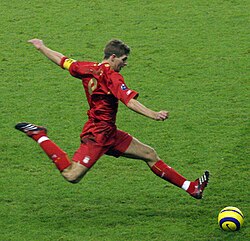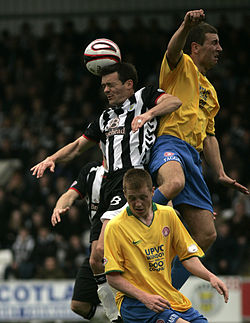
Association football (more commonly known as football or soccer) was first codified in 1863 in England, although games that involved the kicking of a ball were evident considerably earlier. [1] A large number of football-related terms have since emerged to describe various aspects of the sport and its culture. The evolution of the sport has been mirrored by changes in this terminology over time. For instance, the role of an inside forward in variants of a 2–3–5 formation has many parallels to that of an attacking midfielder, although the positions are nonetheless distinct. [2] Similarly, a 2–3–5 centre half can in many ways be compared to a holding midfielder in a 4–1–3–2. [3]
Contents
In many cases, multiple terms exist for the same concept. One reason for this is the progression of language over time. The sport itself, originally known as association football, is now more widely known by the shortened term football, or soccer, derived from the word association. [4] Other duplicate terms can be attributed to differences among varieties of English. In Europe, where British English is prevalent, the achievement of not conceding a goal for an entire match is known as a clean sheet. [5] In North America, where American and Canadian English dominate, the same achievement is referred to as a shutout. [6]
Occasionally the actions of an individual have made their way into common football parlance. Two notable examples are Diego Maradona's goals in Argentina's 1986 World Cup quarter-final win against England. After the match, Maradona described his first goal—a handball that the referee missed—as having been scored "a little bit by the hand of God, another bit by the head of Maradona". [7] His second goal was subsequently voted in a 2002 FIFA poll as the "Goal of the century". Both phrases are now widely understood to refer to the goals in that match. [8]




















